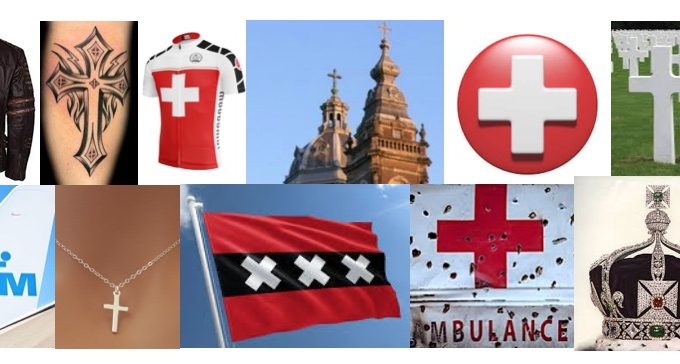
The Cross redefined
Europeans cannot get away from the cross. Although through familiarity we have become blind to the cross and the startling message it carries, it can be seen almost everywhere.
Take a look around. We see it on many national flags, national sports clothing, as decorations around necks, on bikers’ leather jackets, on buildings, on church spires, in town squares and marketplaces, as tattoos, on hospital signs, first aid posts, medical kits, dispensaries, graveyards, wayside shrines, on the emblems of crowns on official symbols, buildings and stationery, and much more!
Even as I write this from my living room in Amsterdam, I can see on the facade of the Central Station coats of arms of cities with which Amsterdam traded, some emblazoned with crosses. A truck has just driven by with a big cross advertising a drugstore chain. The red, black and white Amsterdam flag with three St Andrew’s crosses flutters from the hotel next door. The highest point of all the buildings in my field of vision is the baroque cross on the dome of the St Nicholas basilica. KLM planes fly overhead coming into land at Schiphol, bearing a cross on the company’s crown logo.
How strange! This is a symbol of a cruel Roman instrument of torture and death. How did it become such a celebrated emblem throughout the western world? How did a cross become a symbol of healing, hope, faith and identity?
The answer is: through an event nearly two thousand years ago–the death of Jesus of Nazareth. This event, and only this event, turned that fearsome apparatus of agony into an icon of hope, new beginnings, restoration and rejuvenation. The cross preceded the resurrection, the turning point of history. Our calendars of course still date from the birth of this God-man destined for this decisive event in human history.
Redefined
Jesus redefined the cross for ever. And Europe’s identity has been shaped on this message of healing, forgiveness and hope. From Georgia (whose flag comprises five crosses) and Armenia (whose landscape is littered with distinctive Armenian stone crosses) to Ireland (whose landscape is also strewn with Celtic crosses) and Iceland and the Faroe Islands (whose flags follow those of the other Nordic nations, all with crosses), the message of the cross was eventually embraced by virtually all European peoples.
Despite the deliberate forgetfulness in recent times, it is this story, of the man who rose again after being tortured to death on a cross, that has been the single greatest factor shaping Europe’s society and culture. It is impossible to imagine what Europe would have looked like if Jesus had never lived. Despite all the cultural differences of the peoples inhabiting the European peninsular, this has been the defining identity of being European.
The loss of this identity is the root problem of Europeans and Europe today. Last night I heard the famous American philosopher Francis Fukuyama speaking about identity politics and the crisis of democracy all across the western world. Populism has not just been the result of economic and political factors, he reasoned. He talked a lot about the need for dignity, respect and equality and of the threat many people feel of losing out and of not being respected. Islamism rises he said from Moslems not feeling respected, and the identity crisis experienced by many young Moslems in Europe was the cause of their radicalisation.
Fuse
Yet Europeans generally are also experiencing an identity crisis and this is causing a crisis of democracy across the continent and beyond. A secularist perspective, however, fails to offer a sufficient basis for identity, dignity and equality. Can that really come from a materialist accident of slime-plus-time, from which everything somehow evolved out of nothing?
As Larry Siedentop says, when Paul declared that in Christ there is neither Jew nor gentile, male nor female, bond nor freeman, he lit the fuse for a revolution of identity–not based on blood or social status, but on moral equality before God, and created in his image. This understanding has led to the freedoms that made Europe Europe, with an identity rooted in Christ, however imperfectly expressed in the various forms of Christianity over the centuries.
The rejection of our common historic identity as peoples shaped by the story of Jesus and the understanding of our identity as children of the same Creator and Father of all humans continues to threaten the future of the European project.
This is why Robert Schuman said from the start of that project that it needed a soul: it could not simply be an economic or technological project. But we err when we expect politicians to restore that soul. That’s not their competency. It’s a job for the faith communities.
Jeff Fountain
Director Schuman Centre
For more weekly words from Jeff, visit weeklyword.eu

Very good article, Jeff. Thank you. Yet, the cross is also for many a symbol of oppression due to colonization, the holocaust and more. I wonder if we’ve leaned far too long and too heavily on the glories of the past. Without the Church itself initiating or participating in the dismantling of institutionalized christendom as a form of public repentance and Christians themselves living the life of Jesus by carrying their own crosses as interpreters of their faith with their two feet engaged in the world, can we hope to see trust towards the Christian faith be renewed in Europe or the West? Several of our Canadian YWAMers have and are studying (MA and PhD) with NAIITS, the NA Indigenous Institute of Theology and decolonization is at the heart of the movement. This is in Canada (NAIITS is also in the US and now in Australia), but similar movements most likely exist worldwide in all the colonized nations of the past. The Church in Europe also needs to take ownership of this, does it not?
https://www.naiits.com
Blessings,
Pierre